by PAReS – Professors Self-Assembled in Solidarity Resistance
In the first part of this two-part interview by the PAReS collective, renowned journalist and activist Naomi Klein speaks about disaster capitalism in Puerto Rico and the constitution of opposition movements and political alternatives.
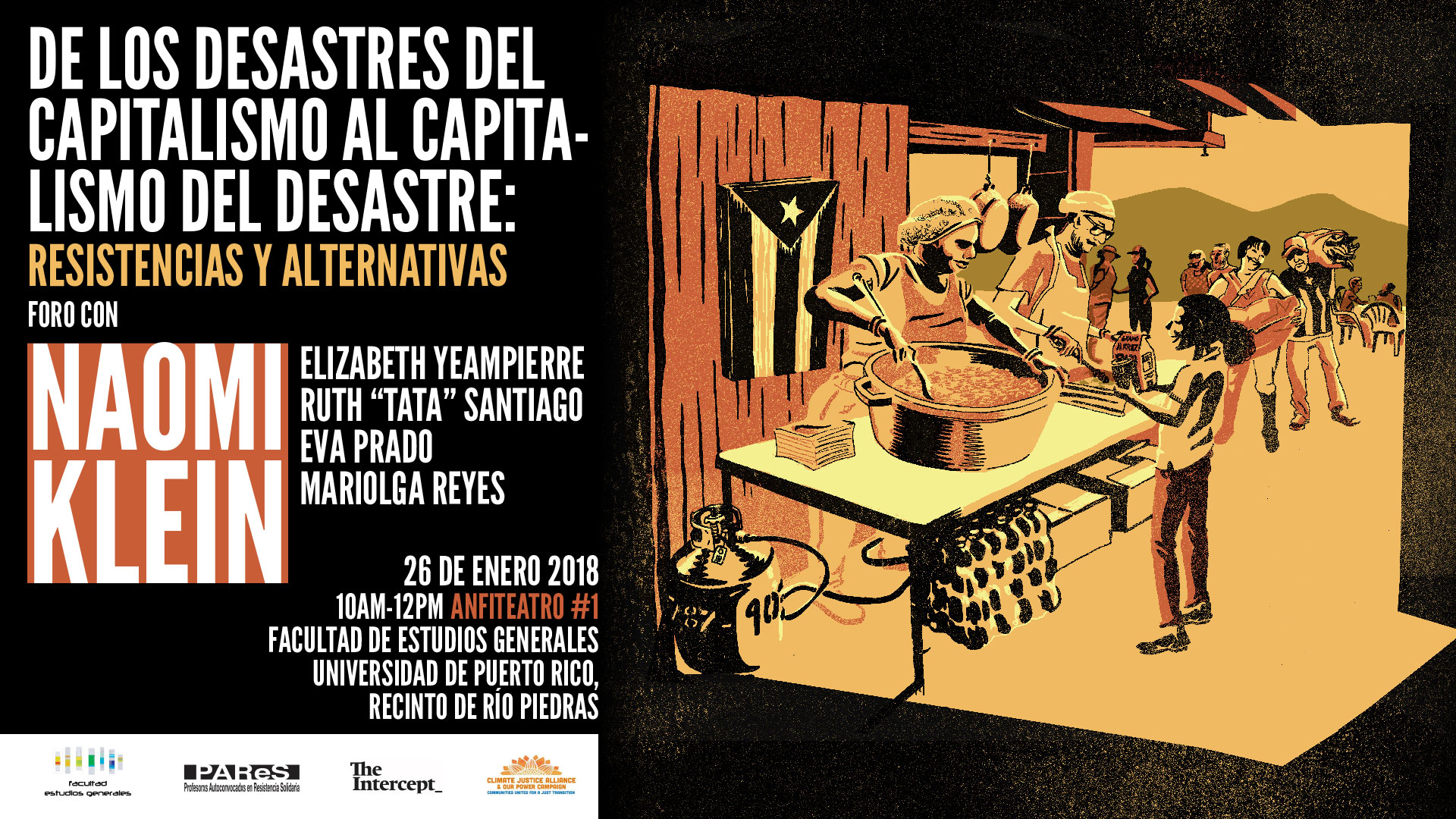
“From the disasters of capitalism to disaster capitalism: Resistance and alternatives”. Art by political art and popular education collective Agitarte. Source: agitarte.info.
Naomi Klein is a renowned journalist, documentarian, and activist in topics related to capitalism, climate change and alter-globalization movements, and author of various books including The Shock Doctrine (2007) and No is Not Enough (2017). Klein was in Puerto Rico at the end of January 2018 at the invitation of the Professors Self-Assembled in Solidarity Resistance (PAReS) collective, created to defend public education during the 2017 University of Puerto Rico student strike. Weeks after the passing of Hurricane Maria in Puerto Rico, members of PAReS met to discuss how to confront the devastation that the country and our university faced.
What concerned us was not only the enormous physical damage caused by the storm but also the intensification of neoliberal policies to come. We knew that the real disaster was not the hurricane but the terrible vulnerability imposed by Puerto Rico’s colonial relationship to the United States, as well as the forced privatization of health and other services; massive layoffs; huge numbers of school closures; reductions in social rights and in investments for collective well-being; abandonment of social and physical infrastructure; and high levels of government corruption and ineptitude.
This vulnerability has been aggravated by Washington’s imposition of the Fiscal Control Board, an unelected body pushing for the privatization of electricity and schools, increased costs of basic services, massive cuts in public education, pensions, vacation time, and other rights—all in order to pay bondholders a $73 billion debt that is patently unpayable, illegal, and illegitimate. The net result was to leave the majority of people in Puerto Rico without a hopeful future, and that was all before Hurricane Maria hit our shores.
With Klein’s visit, PAReS sought to visibilize the problems of colonial-disaster capitalism and the neoliberal shock doctrine after hurricane Maria, as well as alternatives for more just and ecological transformations. This is the first part of a two-part interview by PAReS. The interview took place in the community of Mariana, Humacao, in Puerto Rico’s eastern region, after an encounter of organizations in resistance against disaster capitalism, organized in collaboration with the Climate Justice Alliance and the Proyecto de Apoyo Mutuo of Mariana. At The Intercept, you can read Naomi’s powerful investigative essay on Puerto Rico, “The Battle for Paradise”, forthcoming as a book with Haymarket Press, or watch Lauren Feeny‘s excellent documentary.

Naomi Klein talks with grassroots movement leaders in Mariana, Humacao., January 28 (Photo: Federico Cintron Moscoso)
PAReS: What are your impressions of what is happening in Puerto Rico organizing the resistance to disaster capitalism?
Naomi: It’s great to be here at a meeting of organizations where people are coming together and coming up with a shared vision. It seems like the teacher’s unions are ready for this fight. Whereas, I think other organizations are just really beat up, and not in a strong opposition. So I think it’s one of these situations where the people who have the strength and capacity need to share that and help people get back up. I’ve seen a huge range of preparedness, disaster preparedness.
And I think that there are some organizations that were very much ready for this moment, and had an analysis that was ready and had solutions that were already in place. And obviously, those were the ones that were in the best position [to respond] like Casa Pueblo for instance. They already had a vision of the world that fits with how to be free of this heightened dependency, with energy and food sovereignty. So, I think people that are already thinking along those lines have risen in this moment in extraordinary ways, but people who were in a more centralized thinking, take a while to adapt.
PAReS: From your experience as activist, journalist and writer, how is grassroots power built? How can people mobilize effectively?
Naomi: I think that we are in a moment where there needs to be a plan and vision for how to emerge from these multiple, overlapping, intersecting crises that are affecting Puerto Rico right now. I think that you are actually in a better position than you might be. It’s only been a few months since there where 100,000 to 200,000 people on the streets against austerity [in May 1 of 2017]. In addition, there was the students’ strike. That movement is not gone. I think that getting to mobilize people is clearly possible. These mobilizations happened because of the debt and austerity.
It seems to me that the task now is connecting the dots into a coherent analysis of the factors that created the crisis, but equally important, what the real solutions are. At this moment there are so many false and incredibly dangerous ‘solutions’ pushed on the population. It’s really like a race against time. There was a brief period where that vision of exploiting the crisis to heightened inequality and dependency, to push for more privatization and austerity, had a brief pause, but it came back with a vengeance, indeed it happened while I was here, with the announcement about [the privatization of] PREPA [Puerto Rico Electric Power Authority], and the fiscal plan being unveiled.
There has to be a counter-narrative, which explains what’s the people’s plan in response to this brutal plan that has emerged. Personally, I think that just opposing these [disaster capitalism] plans was never enough. But when the status quo is as completely unacceptable as it is right now, I don’t think any battle that is purely defensive is going to be capable of mobilizing, not because there isn’t that organizational capacity, but because it’s not going to inspire people. The role of organizers and intellectuals in this moment is to expand the menu of possibilities on the table. Right now there is this false choice: either the status quo that is failing people brutally, or the promise, however false, that by allowing corporations even more of what they want, somehow things will get fixed. This is a moment for change, people want it, and the menu for change has to be expanded.
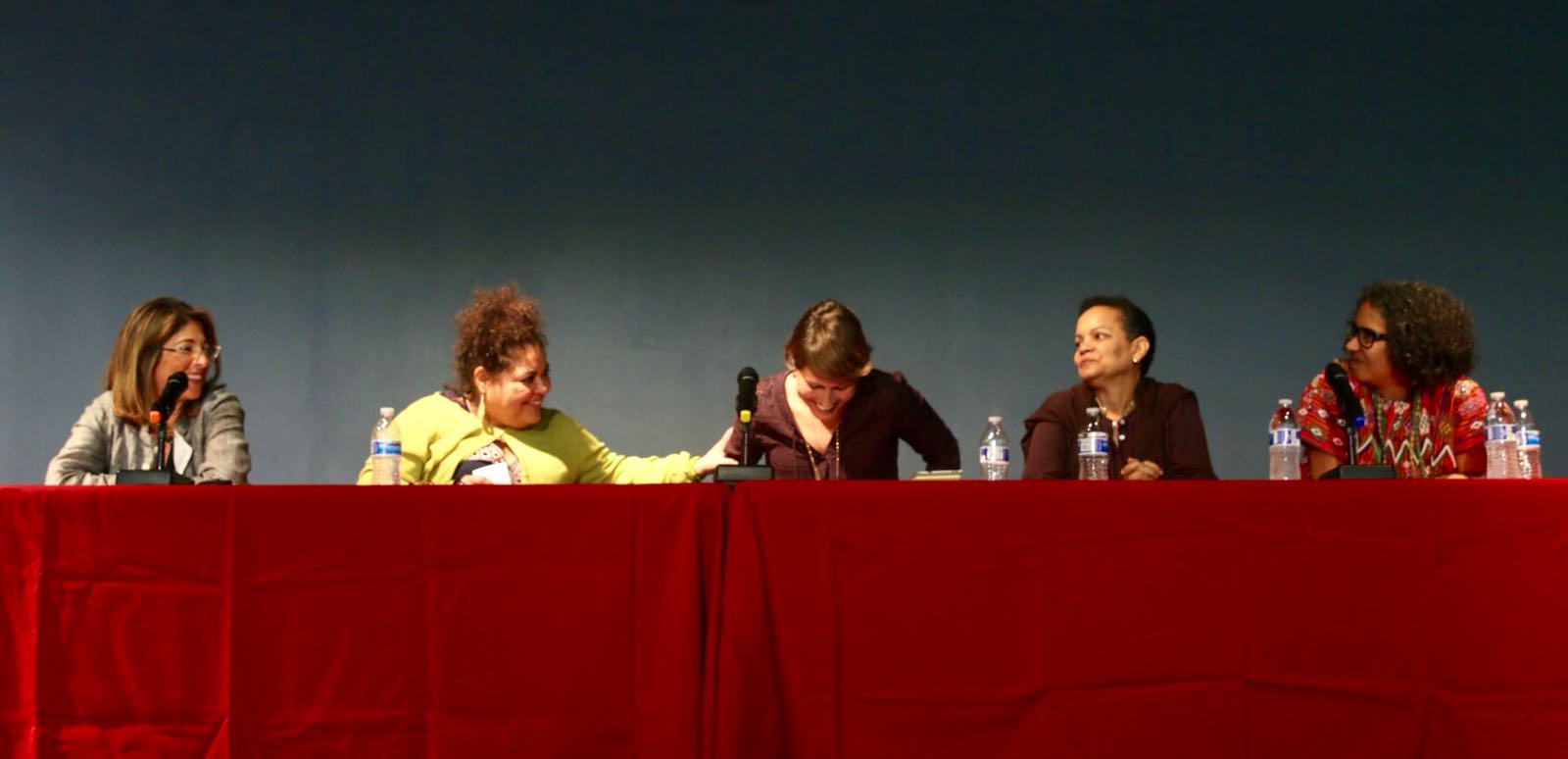
“De los desastres del capitalismo al capitalismo del desastre: resistencias y alternativas”, January 26 2018, organized by PAReS with the support of The Intercept, the Climate Justice Alliance and Our Power Campaign, and the Faculty of General Studies, University of Puerto Rico, Río Piedras. The Forum showed the power of the voices of those in the struggles for multiple sovereignties in Puerto Rico and across the globe. From left: Naomi Klein (The Intercept); Elizabeth Yeampierre, (UPROSE and Climate Justice Alliance); Eva Prado (Frente Ciudadano por la Auditoría de la Deuda); Ruth “Tata” Santiago (Iniciativa de Eco-Desarrollo de Bahía de Jobos); and Mariolga Reyes Cruz (PAReS). Photo: 80grados. Art of the event by Agitarte.
PAReS: Given that the logic behind activism has been mostly concerned with ‘no’, that is, with opposition to certain projects, do you think changing leftist politics into “yes” politics necessarily requires a change of tactics like making a political party or an alliance for an electoral option?
Naomi: I think it certainly requires an engagement with politics. I don’t know what form it takes, maybe taking over an existing political party, starting a new political party, or starting a people’s platform that includes a process that decides what its political manifestation is. I also think that if we want to captivate people, we have to have forms of politics that reflect the urgency of our historical moment; it requires an engagement with big “P” politics on the biggest scale that we are able to affect. This doesn’t mean that we don’t organize in our cities and our neighborhoods. But the idea that we can leave politics to other people, to me is an abdication of the moment: the small-scale work is not going to significantly lower emissions, or fundamentally battle inequality, or create new power dynamics. So I think we have to up our ambition.
That “we” is everywhere, not just in Puerto Rico. What I see, particularly among millennials, is that they’re much more willing to get their hands dirty. They’re much less purist than my generation was, we said “change the world without taking power, I’m not going to get my hands dirty, and we are leaderless”. People are living with contradictions, there are “anarchists for Bernie Sanders”. They’re doing it on every level because they feel that sense of urgency and they are tired of not winning. I think that’s amazing. We see that in the UK, with all these organizations that have always been outside of politics that are engaging in a campaign. It also requires politicians who are willing to work with movements, like Sanders or Corbyn.

“Glory to the hands who work”, mural at the entrance of La Loma of Mariana, the home of Proyecto de Apoyo Mutuo. The words are the title of a famous poem by Socialist League leader political philosopher and poet Juan Antonio Corretjer.
The interview was carried out by Mariolga Reyes Cruz, Juan Carlos Rivera Ramos, Bernat Tort Ortiz, Federico Cintrón Moscoso, and Gustavo García López, members of PAReS. It was transcribed by Luis López and Damián Irizarry, students at the University of Puerto Rico Graduate School of Planning.


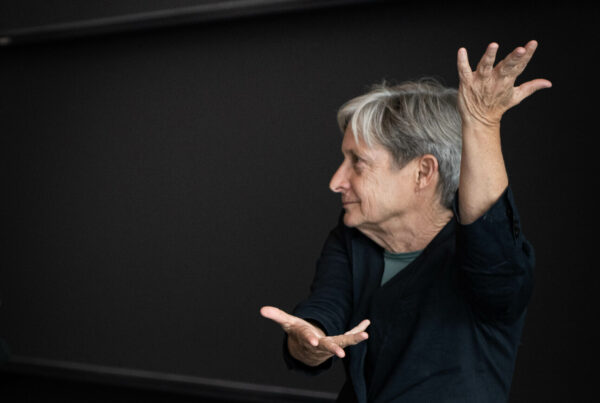
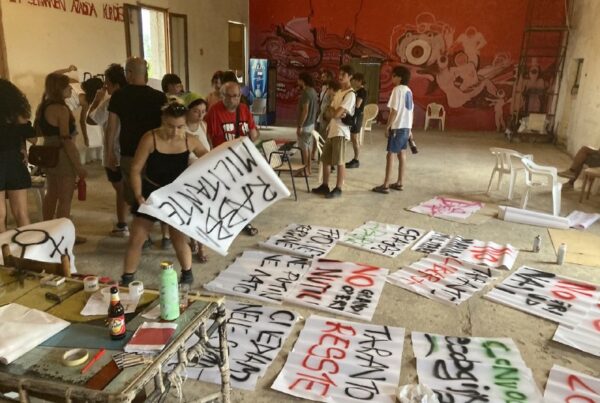
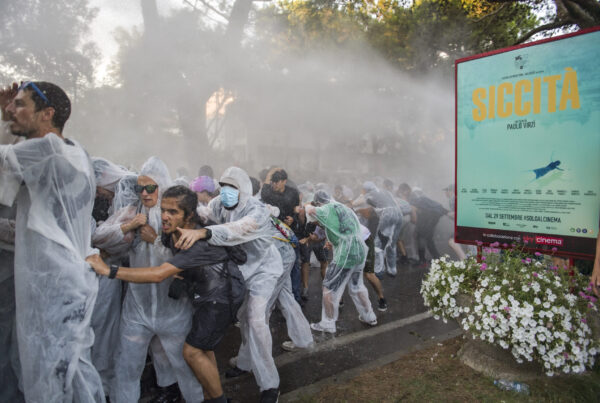

Reblogged this on Political Ecology Network.
Thanks for sharing Katharine!
You’re welcome!